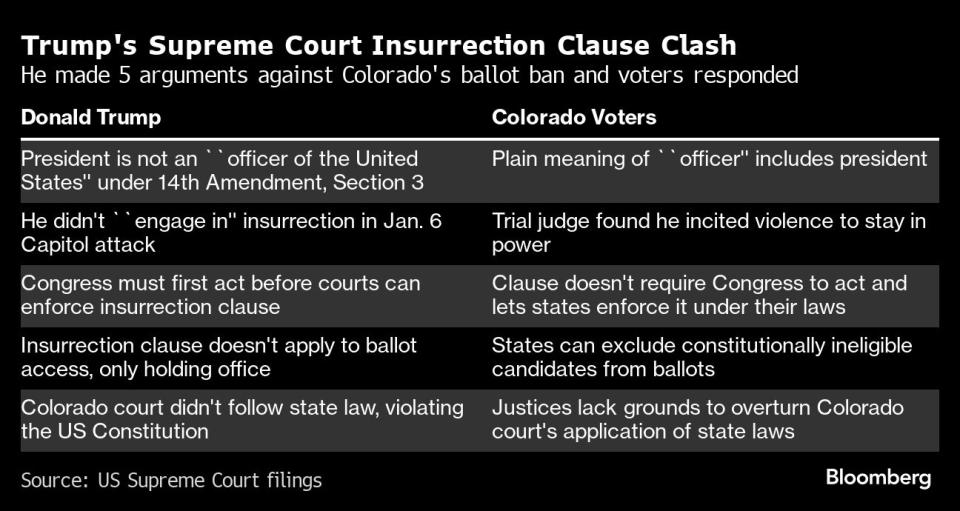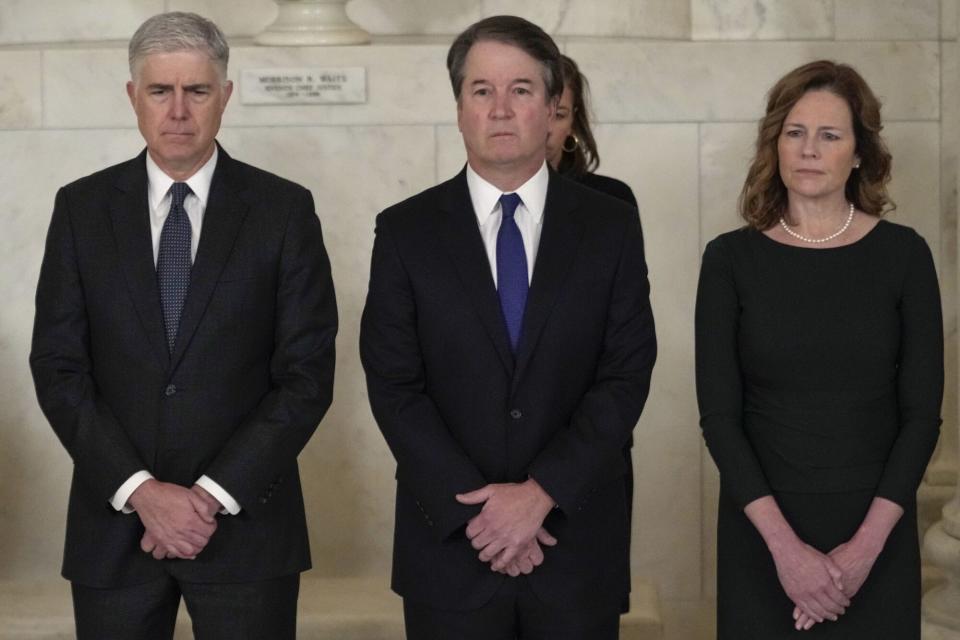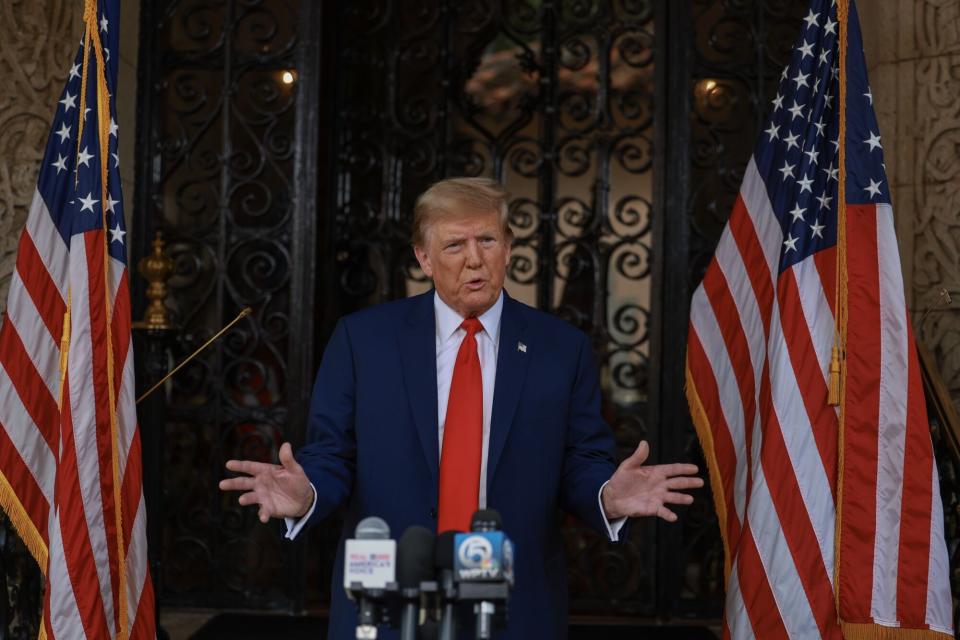Supreme Court Casts Doubt on Effort to Bar Trump From Ballot
- Oops!Something went wrong.Please try again later.
- Oops!Something went wrong.Please try again later.
- Oops!Something went wrong.Please try again later.
- Oops!Something went wrong.Please try again later.
(Bloomberg) -- The US Supreme Court appeared poised to keep Donald Trump on this year’s presidential election ballot, as the justices weighed a historic clash over Colorado voter efforts to disqualify him over his role in the Jan. 6 Capitol riot.
Most Read from Bloomberg
Biden’s Attempt to Address Memory Issue Backfires With New Gaffe
China’s Property Crisis Is Starting to Ripple Across the World
Stock Mania Rages On as S&P 500 Closes Above 5,000: Markets Wrap
In an argument session that lasted just over two hours, liberal and conservative justices alike questioned whether the Colorado Supreme Court had power to exclude Trump on the grounds that he engaged in an insurrection.
Justice Elena Kagan said the Colorado decision had national implications. “Why should a single state have the ability to make this determination not only for their own citizens but for the rest of the nation?”
Trump is seeking a broad ruling that would end the push around the country to kick him off state ballots. The high court for the first time is interpreting the 14th Amendment provision that bars people from returning to office if they took an oath to support the Constitution and then engaged in insurrection.
The 14th Amendment Challenge to Trump, Explained: QuickTake
Justices from across the court’s ideological spectrum voiced doubts that the provision, known as Section 3, lets a single state have such a broad impact on a presidential election. And Chief Justice John Roberts said that if the court upholds the Colorado ruling, other states will follow suit.
“I would expect that a goodly number of states will say whoever the Democratic candidate is, you’re off the ballot, and others for the Republican candidate, you’re off the ballot,” he said. “It will come down to just a handful of states that are going to decide the presidential election. That’s a pretty daunting consequence.”
The high court is handling the case on an expedited basis, meaning a ruling could come in weeks, rather than the usual months.
The court may only be getting started with Trump and Jan. 6. Trump is expected to turn to the Supreme Court on Monday to seek a stay of this week’s appeals court ruling rejecting his claim of immunity from criminal charges over his effort to overturn the election. The justices ultimately might hear arguments in that case as well.
Trump’s three Supreme Court appointees – Neil Gorsuch, Brett Kavanaugh and Amy Coney Barrett – were among the skeptics of the Colorado ruling. Kavanaugh pointed to an 1869 opinion, written by Chief Justice Salmon Chase in his separate capacity as a lower court judge, that said Congress needed to act before Section 3 could be enforced.
“That seems to me highly probative of what the meaning or understanding of that language — otherwise elusive language – is,” Kavanaugh said.
Though the atmosphere was tense and solemn in the courtroom, there were moments of levity. Kavanaugh and Kagan laughed privately together at several points.
Trump said he watched the oral arguments from his Mar-a-Lago club. Cable news outlets played an audio feed of the proceedings.
“Can you take the person that’s leading everywhere and say, ‘hey, we’re not going to let you run’?” Trump said. “I think that’s pretty tough to do, but I’m leaving it up to the Supreme Court.”
Trump’s eligibility is being challenged by a group of Colorado voters, represented by the advocacy group Citizens for Responsibility and Ethics. Their lawyer, Jason Murray, told the justices that the Capitol riot “was incited by a sitting president of the United States to disrupt the peaceful transfer of presidential power.”
But he drew pushback even from liberal wing of the conservative-controlled court. Justice Ketanji Brown Jackson questioned whether Section 3 even applies to the president. The provision lists people who are covered, including those who serve as an “officer of the United States,” but doesn’t explicitly mention the president on that list.
“Why didn’t they put the word ‘president’ in the very enumerated list in Section 3?” she asked Murray. “The thing that really is troubling to me is, I totally understand your argument, but they were listing people that were barred, and president is not there.”
Though Trump has multiple ways to win the case before the justices, his lawyer, Jonathan Mitchell, focused heavily on contentions that would definitely resolve the issue nationwide. He said “officer of the United States” is a legal term of art that elsewhere in the Constitution clearly excludes the president.
“This was the text that was settled upon,” he said, while acknowledging that “it does seem odd that President Trump would fall through the cracks in a sense.”
The justices steered clear of Trump’s argument that he didn’t engage in insurrection. In concluding he did, the Colorado Supreme Court pointed to his unsupported claims of a stolen election, his fiery Jan. 6 speech and his demands that Vice President Mike Pence refuse to certify the results.
A ruling against Trump would keep him off the ballot this year in Colorado and potentially in Maine, where the state’s top elections official has moved to block Trump. Litigation is already underway in other states.
The case is Trump v. Anderson, 23-719.
--With assistance from Jordan Fabian and Emily Birnbaum.
(Updates with reaction from Trump, comments from justices starting in 12th paragraph.)
Most Read from Bloomberg Businessweek
OpenAI’s Secret Weapon Is Sam Altman’s 33-Year-Old Lieutenant
How Jack Dorsey’s Plan to Get Elon Musk to Save Twitter Went South
A Tiny Fund Takes a Big Short on Corporate Debt Maturity Wall
©2024 Bloomberg L.P.




